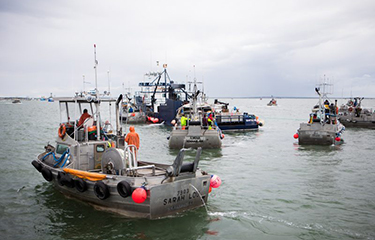The U.S. Environmental Protection Agency has followed through on its promise of Clean Water Act protections for Alaska’s Bristol Bay watershed, issuing a revised proposal for public comment 25 May that would all but eliminate the project.
Fishing and environmental groups in Alaska said they hope the move will kill the proposed Pebble Mine and end more than 20 years of debate over the level of protections needed for the world’s most-productive sockeye salmon habitat from the effects of mining for gold, copper, and other metals.
“The Bristol Bay watershed is a shining example of how our nation’s waters are essential to healthy communities, vibrant ecosystems, and a thriving economy,” EPA Administrator Michael S. Regan said. “EPA is committed to following the science, the law, and a transparent public process to determine what is needed to ensure that this irreplaceable and invaluable resource is protected for current and future generations.”
The agency issued a revised proposed determination under Clean Water Act Section 404(c) “to prohibit and restrict the use of certain waters in the Bristol Bay watershed as disposal sites for the discharge of dredged or fill material associated with mining the Pebble deposit.” If finalized, EPA’s Section 404(c) determination "would help protect the Bristol Bay watershed’s rivers, streams, and wetlands that support the world’s largest sockeye salmon fishery and a subsistence-based way of life that has sustained Alaska Native communities for millennia,” according to the agency.
The determination would prohibit discharges of dredged or fill material associated with mining the Pebble deposit into waters within the mine site footprint as outlined in a 2020 plan, located in the South Fork Koktuli River, North Fork Koktuli River, and Upper Talarik Creek watersheds.
It would also restrict discharges from any future plan to mine the Pebble deposit into certain waters of the South Fork Koktuli River, North Fork Koktuli River, and Upper Talarik Creek watersheds that would result in adverse effects similar to those associated with the 2020 mine plan.
The agency found that dredged or fill material from mining the Pebble deposit could adversely affect salmon habitat, including “the permanent loss of 8.5 miles of streams would result in fish displacement, injury, and death.
EPA's decision takes into consideration information "that has become available since the agency’s 2014 proposal" – including new scientific analyses and the Pebble Limited Partnership’s 2020 mine plan, it said.
“The total economic value, including subsistence uses, of the Bristol Bay watershed’s salmon resources was estimated at more than USD 2.2 billion [EUR 2.1 billion] in 2019,” according to the EPA. “The Bristol Bay commercial salmon fishery generates the largest component of this economic activity, resulting in 15,000 jobs and an economic impact of USD 2 billion [EUR 1.8 billion] in 2019, USD 990 million [EUR 924 million] of which was in Alaska.”
The proposed action would not apply to any other resource development projects in Alaska, EPA said.
Bristol Bay protection advocates cheered the decision by the EPA.
“As stewards of these lands and waters since time immemorial, our people welcome this step towards permanent protections for our waters and way of life,” United Tribes of Bristol Bay Executive Director Alannah Hurley said. “Today’s announcement by the EPA is a good start in this effort. It’s clear the science supports the need for our region’s headwaters to be protected from a mine like Pebble’s impacts, at the site and downstream. We appreciate EPA’s efforts to address the threat Pebble poses to our lands, waters, and way of life in Bristol Bay, and hope to see the agency finalize strong protections this year.”
The Bristol Bay Coalition has planned a 1 June press conference and virtual town hall in Dillingham to discuss the EPA proposal and its plan to help advance it.
The EPA's public comment period comes as the Bristol Bay community is looking forward to a potential banner year for sockeye salmon runs.
“With a predicted record-breaking fishing season kicking off shortly, it couldn’t be more clear what is at stake if Pebble Mine were built: Thousands of jobs, a sustainable economy, and an irreplaceable way of life are all on the line. For years, Bristol Bay’s fishermen have been asking the EPA to finalize Clean Water Act protections for our fishery and stop the Pebble Mine,” Commercial Fishermen for Bristol Bay Director Katherine Carscallen said. “Before we head out on our boats, we’ll weigh in once again and urge the EPA to protect Bristol Bay’s USD 2.2 billion [EUR 2 billion] sustainable economy and the 15,000 jobs imperiled by the Pebble Mine."
Bristol Bay Regional Seafood Development Association Executive Director Andy Wink said the regional salmon industry is looking forward to having the debate on the Pebble Mine settled after a decades-long battle.
“Our industry has been operating with the Pebble Mine hanging over us for far too long. This threat has created tremendous uncertainty and risk for our fishermen and seafood processors who have invested hundreds of millions of dollars into fishing boats, fishing permits, and processing plants,” he said. “We look forward to the EPA completing its 404(c) process as quickly as possible so that our industry can focus on harvesting and supplying the world with Bristol Bay sockeye.”
During the administration of former U.S. President Barack Obama, the EPA proposed Bristol Bay protections in 2014, but legal challenges from the mine's backers prevented their adoption before Obama left office. The administration of former U.S. President Donald Trump initially appeared to back the Pebble Mine, but then Bristol Bay protection advocates received support for their cause from some conservatives, including the then-president’s son Donald Trump Jr., an avid angler.
The EPA announced in September 2021 it would again seek Clean Water Act protections. The agency said the revised measure “evaluates an extensive record of scientific and technical information that spans nearly two decades.”
Reporting by Kirk Moore
Photo courtesy of the Bristol Bay Regional Seafood Development Association







